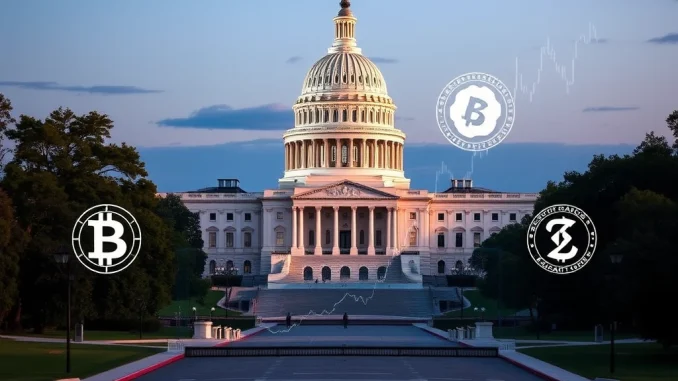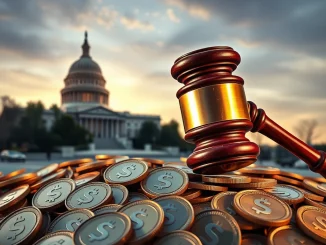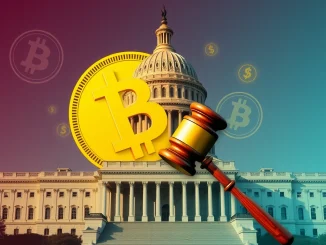
The cryptocurrency world is watching Washington closely. A potential US Senate vote on the GENIUS Act is reportedly on the horizon this week, sparking intense discussions and negotiations that could significantly impact stablecoin regulation.
What is the GENIUS Act and Why the Urgency?
At its core, the GENIUS Act aims to establish a federal framework for regulating stablecoins in the United States. Stablecoins, digital assets pegged to stable references like the US dollar, have grown rapidly in importance, but their regulatory status remains unclear. This proposed US crypto bill seeks to provide that clarity, focusing primarily on two critical areas:
- Issuer Licensing: Mandating that entities issuing stablecoins obtain specific licenses, likely from federal or state regulators. This aims to ensure that only approved and vetted entities can operate in the stablecoin market.
- Reserve Requirements: Establishing clear rules on what assets stablecoin issuers must hold in reserve to back the value of their tokens. The goal is to ensure that stablecoins are truly backed 1:1 and can be redeemed reliably, preventing scenarios like the collapse of TerraUSD.
The push for a Senate vote this week, as reported by sources like Crypto in America, highlights the growing pressure on lawmakers to address the regulatory void surrounding these digital assets. Proponents argue that clear rules are essential for protecting consumers, maintaining financial stability, and fostering responsible innovation in the crypto space. Without federal crypto regulation, the market could remain fragmented and potentially risky.
Amendments Heating Up the Debate
As the bill moves closer to a potential vote, various amendments are being proposed, adding layers of complexity to the negotiations. These proposed changes reflect differing views within the Senate on the scope and strictness of stablecoin regulation. Key amendments reportedly include:
- New Disclosure Rules: Requiring stablecoin issuers to provide more detailed and frequent information about their reserves, audits, and operational practices. This aims to increase transparency for both regulators and the public.
- Foreign Ownership Restrictions: Potentially limiting or prohibiting foreign entities from issuing stablecoins in the U.S. market or imposing stricter requirements on them. This reflects concerns about national security and control over financial infrastructure.
These amendments are subjects of intense bipartisan negotiation. Finding common ground on these points is crucial for the bill’s passage. The debate around these additions underscores the Senate’s attempt to craft comprehensive crypto regulation that balances innovation with necessary safeguards.
Potential Roadblocks: The Credit Card Competition Act
Despite the momentum, a significant hurdle remains: the Credit Card Competition Act. This separate piece of legislation, which aims to alter how credit card transactions are routed, is reportedly causing procedural delays. Because of how bills move through the Senate, the Credit Card Competition Act could potentially be attached to or otherwise impede progress on the GENIUS Act. This legislative maneuvering adds uncertainty to the timeline for a Senate vote.
The intersection of seemingly unrelated bills is common in Washington but frustrating for those hoping for swift action on a US crypto bill. Navigating these procedural complexities is a key challenge for the bill’s sponsors.
Why Does This Potential Vote Matter for Crypto?
A successful Senate vote on the GENIUS Act would be a landmark moment for crypto regulation in the U.S. It would signal Congress’s willingness and ability to pass significant digital asset legislation. For the stablecoin market specifically, it would provide much-needed regulatory certainty. While some in the industry may push back on specific requirements, a clear framework is generally seen as positive for long-term growth and institutional adoption.
Conversely, if the bill fails or is significantly delayed, it could perpetuate the current state of regulatory ambiguity, potentially pushing stablecoin innovation overseas or leaving consumers exposed to risks.
What to Watch For This Week
All eyes are now on the Senate calendar. If negotiations resolve the outstanding issues, particularly the conflict with the Credit Card Competition Act, a vote could indeed happen before the week concludes. Market participants, developers, and consumers interested in stablecoins and the broader crypto ecosystem should monitor official Senate announcements and reputable news sources closely for updates on the GENIUS Act and the potential Senate vote.
Conclusion: A Critical Juncture for US Crypto Regulation
The potential Senate vote on the GENIUS Act represents a critical juncture for stablecoin regulation and the future of the US crypto bill landscape. While challenges remain, including contentious amendments and procedural hurdles posed by other legislation, the push for action is undeniable. The outcome of this week could set a significant precedent for how digital assets are governed in the United States for years to come. Stay informed as this crucial legislative process unfolds.



